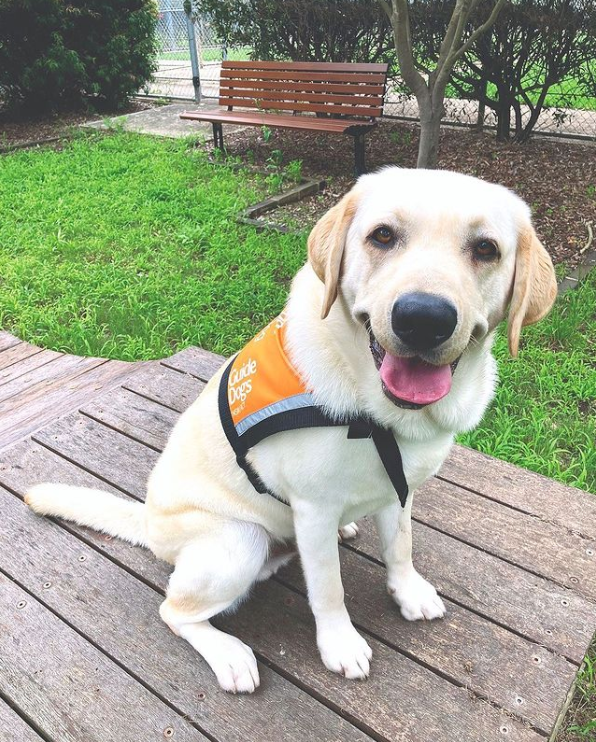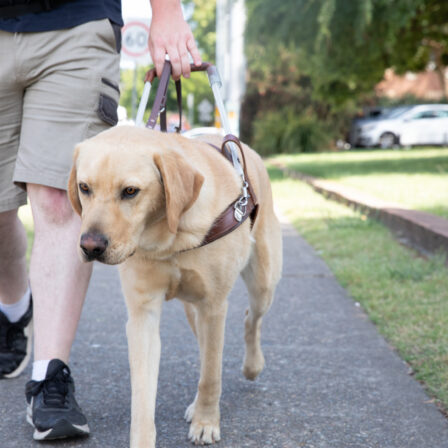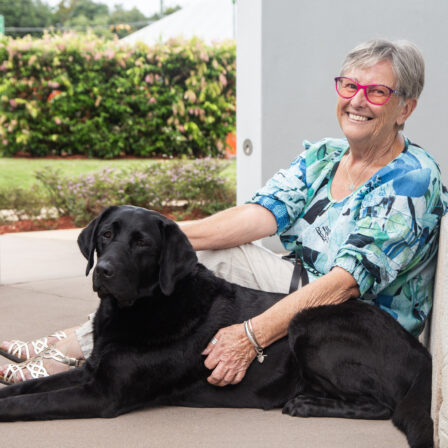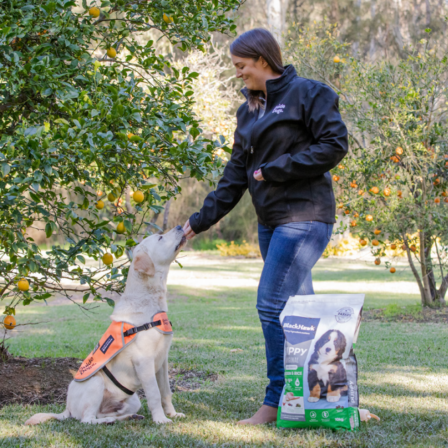News
A Pawsitive Presence: The Key Traits of Effective Therapy Dogs
September is Therapy Dog Awareness Month. At Guide Dogs, we are celebrating the Therapy Dogs who play an invaluable role in bringing comfort, companionship, and healing to individuals in various settings, ranging from hospitals and nursing homes to schools and family homes. These furry companions have a unique set of traits that make them well-suited for the demanding task of providing emotional support to those in need.
Therapy Dog Specialist Elisha Lamont says, “every one of our dogs is unique and so I love getting to know each and every one of them and working out their skills and quirks and finding the perfect job for them.”
While every dog is special in its own way, certain key traits distinguish a successful Therapy Dog from the rest.
Temperament: Calm and Gentle
Perhaps the most critical trait of a Therapy Dog is a calm and gentle temperament. These dogs need to remain composed in unfamiliar and often emotionally charged environments. They must be patient and tolerant of different types of touch, interactions, and sometimes even unexpected noises. A Therapy Dog’s soothing presence can alleviate stress and anxiety, making it vital that they are relaxed and not easily startled.

Read more: Therapy Dog Yale has a special role helping to alleviate anxiety for students at a school in Western Sydney.
Sociability: Friendly and Engaging
Therapy Dogs need to be naturally social and friendly, readily approaching and engaging with people of all ages and backgrounds. An outgoing nature helps create a positive atmosphere and encourages individuals to interact with the dog, leading to improved emotional well-being. Dogs that enjoy human company and thrive on attention are more likely to excel in the Therapy Dog role.
Obedience: Well-Trained and Responsive
Basic obedience skills are a must for any Therapy Dog. A well-trained dog is more predictable in their behaviour, allowing handlers to maintain control in various situations. Commands such as “sit,” “stay,” and “leave it” are not just for show; they ensure the safety and comfort of both the dog and the people they’re interacting with. An obedient Therapy Dog can help build trust and provide a sense of security to those they visit.
Adaptability: Comfortable in Different Environments
Successful Therapy Dogs are adaptable and can comfortably navigate a variety of environments. They may find themselves in busy hospitals one day and calm nursing homes the next. These dogs should be comfortable with being transported and unfazed by new sights, sounds, and smells. Their ability to quickly adjust to changing surroundings contributes to their effectiveness in providing comfort to people wherever they’re needed.
Empathy: Intuitive Connection
While dogs can’t verbalise their feelings, they have an uncanny ability to sense human emotions. A great Therapy Dog possesses a certain level of empathy, being attuned to the emotional states of those they interact with. They can provide a reassuring presence that communicates understanding without words. This intuitive connection is often what makes Therapy Dogs so powerful in their impact.

Read more: meet Therapy Dog Bruno and learn how he uses his powers of perception to help young student Max.
Health and Well-Being: Physically Fit and Healthy
Maintaining the health and well-being of a Therapy Dog is of utmost importance. Regular veterinary check-ups, proper nutrition, and regular exercise ensure that the dog remains physically fit and able to carry out their duties. A healthy dog is not only more capable of providing support but also demonstrates the commitment of their Handler to their role.
Successful Therapy Dogs possess a combination of innate qualities and learned skills that enable them to bring comfort to individuals in need. Their calm temperament, friendly sociability, obedience, adaptability, empathy, and overall well-being collectively contribute to their effectiveness as emotional support companions. These remarkable dogs offer a unique form of healing, reminding us of the profound bond between humans and animals.











